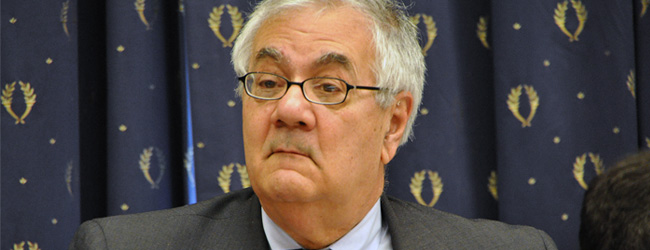National
Frank: ‘Zero chance’ for LGBT bills next year
Gay congressman hopeful on ‘Don’t Ask’ repeal in lame duck

Gay U.S. Rep. Barney Frank (D-Mass.), who won re-election last week in one of his toughest challenges, said LGBT legislation would have no chance of passing in Congress under the Republican-controlled House next year.
In an interview Tuesday with the Washington Blade, Frank also said he was confident that the Senate, of which Democrats retained control, would join President Obama in blocking any anti-gay bills that conservative Republicans might introduce over the next two years.
“Next year there’s no chance of anything happening,” he said of pro-LGBT legislation. “There’s zero chance.”
He added, “It will be a status quo. They don’t have the votes to hurt us but we don’t have the votes to advance anything in the cause.”
Frank also said he was certain that Republicans would fail in an attempt to overturn D.C.’s same-sex marriage law.
“Do you think Barack Obama is going to sign a bill to repeal the D.C. marriage law,” he asked. “It won’t go through the Senate. There is no chance that could happen. None—zero.”
Frank noted that only five out of 179 House Republicans voted earlier this year to repeal “Don’t Ask, Don’t Tell.”
“The Republicans have become much more anti-gay in their voting patterns,” he said. “There is zero chance of anything good happening with Republicans in control of the House.”
Frank said he was hopeful that the Senate would vote to repeal “Don’t Ask, Don’t Tell” in the congressional lame duck session over the next two weeks. The House passed a “Don’t Ask, Don’t Tell” repeal measure earlier this year as part of a defense authorization bill.
The Senate killed a similar defense authorization bill containing “Don’t Ask, Don’t Tell” repeal language in a filibuster organized by Sen. John McCain (R-Ariz.). Every Senate Republican voted against a cloture motion to break the filibuster.
Frank noted that a number of GOP senators cited the Senate bill’s inclusion of a controversial immigration provision known as the DREAM Act as their reason for voting against the bill, saying they otherwise would have supported repeal of “Don’t Ask, Don’t Tell.”
He said Senate Majority Leader Harry Reid (D-Nev.) told him he won’t insert the DREAM Act immigration language in the defense authorization bill when he brings it to the Senate floor in the lame duck session.
With the immigration language removed as an “excuse,” Frank said he’s hopeful that Republican senators who support repeal of “Don’t Ask, Don’t Tell” will now join Democrats in supporting the overall defense bill to which repeal language will be attached. Among the GOP senators that repeal advocates hope will back the bill this time are Sens. Susan Collins and Olympia Snow, both from Maine.
In one of his first comments on a campaign ad by the conservative gay Republican group GOProud opposing him in his re-election race, Frank said the ad had little or no impact on the election.
He noted that his GOP opponent, Sean Bielat, opposes repealing “Don’t Ask, Don’t Tell” and is against “every other gay issue.”
“So I have no idea who these people are,” he said of the GOProud group. “And they have no influence whatsoever. The LGBT community in my district continues to be virtually unanimously supportive.”
The following is a transcript of the Blade’s interview with Rep. Frank, conducted on Nov. 8.
Rep. Barney Frank: I’ve been working today on “Don’t Ask, Don’t Tell.” In fact, I think it’s time for people to hold the Republicans’ feet to the fire because we didn’t get any votes from them. Last time around, they had the excuse – some of them – that they didn’t want to vote because [Senate Majority Leader] Harry [Reid] was going to put the DREAM Act in there on immigration. He now says he’s not going to put the DREAM Act in there. He’s going to put that in some other place. So now the question is why do Republicans — Sen. Snow, Sen. Collins and Sen. Brown — what reason would they have for voting against the whole bill?
And I spoke today to Pete Rouse [the acting White House Chief of Staff] and to Sen. Reid and Sen. [Richard] Durbin [D-Ill.] and Sen. [Carl] Levin [D-Mich.], and they all agree. They want to pass the defense bill with ‘Don’t Ask, Don’t Tell’ in it. They have two weeks. The question is whether Republicans filibuster it to death. But the Democrats are going to try very hard to do it. I think by the way, that’s why [Secretary of Defense Robert] Gates spoke out. I am sure, nobody’s told me this, but I’m sure the president said to Harry Reid, look, we’ve got to get this done. And Reid said fine, would it be helpful if I got some military support? And eventually Gates spoke out as he did.
Washington Blade: Your press person sent us a copy of your statement on that today.
Frank: I’ve spent — I made a lot of phone calls today. Plus, one fear was I saw, oh well, they’ll take ‘Don’t Ask, Don’t Tell’ back out of the defense bill. It won’t pass in the House if they do that. I believe the speaker wouldn’t allow it to come up.
Blade: Do you mean next year?
Frank: No, [Rep. John] Boehner [R-Ohio, who will become Speaker of the House in January] is not who I was talking about. The thought was that the Republicans would say if they took ‘Don’t Ask, Don’t Tell’ out of the [defense] bill this year in the lame duck session they would get it passed. And my answer is that’s not going to get them anywhere because we wouldn’t pass it in the House. We will not accept — there’s been some speculation about that — and the answer is no, the House—we’re going to tell the Senate that’s not going to work. And I don’t think the Senate is planning to do that. Harry is not planning to do that.
… ‘Don’t Ask, Don’t Tell’ repeal is in the defense authorization bill. What I just said was there was some suggestion that [Sen. John] McCain [R-Ariz.] would say strip that out and I’ll let you pass the defense bill. And the answer is that won’t work because the House won’t pass it. In other words, the Democratic leadership is thoroughly committed to getting ‘Don’t Ask, Don’t Tell’ repealed. The only question is — you know, Log Cabin says, oh, the Democrats couldn’t do it. Well they got us five Republican votes in the House … And no Republican votes in the Senate. The Democrats can’t do that all by ourselves without a single Republican supporter.
Blade: Did Harry Reid give an indication of when he might bring it up?
Frank: Right away — they only have two weeks. He’s committed to getting it done. He and I talked to the three — the Democratic leader, the Democratic whip, the Democratic committee chairman … They all agree they want to get it done. Unfortunately, if we have no Republican votes it can’t be done. So the question is will any Republicans and their supporters get us anything?
Blade: What’s the prospect of advancing LGBT-related bills next year, when the Republicans take charge of the House?
Frank: Next year there’s no chance of anything happening. There’s zero chance. We got five Republican votes out of 179 to repeal ‘Don’t Ask, Don’t Tell.’ The Republicans have become much more anti-gay in their voting patterns. There is zero chance of anything good happening with Republicans in control of the House.
Blade: Have you heard of anything about a Log Cabin supported gay-related tax reform bill? They won’t give us any details but the head of Log Cabin says that’s the first thing they’re going to work on next year and he thinks they might get Republican support.
Frank: If they’re suggesting that there will be Republican support for recognition of same-sex marriage that’s a lie and they know it. There’s no chance of that.
Blade: I asked them about that and he wouldn’t give me details but —
Frank: Yes, the Log Cabin club would like to make it easier for taxing – they would like to reduce taxes for rich people. I understand that. But there will be no help for gay people. Now for some of them, I think their income is skewed pretty high anyway. So they’ll feel good about it. But, no, there is zero chance that the Republicans will do anything that would recognize same-sex couples.
Blade: What about ENDA? He did say they would try to move ENDA.
Frank: There is zero chance of them doing anything on ENDA — zero.
Blade: Then the next step is whether the Republican majority or some Republicans will try to harm gay people such as attempting to repeal D.C.’s same-sex marriage law.
Frank: They can’t. That would take the president and the Senate … Do you think Barack Obama is going to sign a bill to repeal the D.C. marriage law? It won’t go through the Senate. There is no chance that could happen. None, zero.
Blade: So essentially it’s going to be a standstill?
Frank: It will be a status quo. The one thing we have a chance for is ‘Don’t Ask, Don’t Tell’ repeal in this lame duck session. And we can get that if we get any Republican cooperation. … On the other hand, they don’t have the votes to hurt us but we don’t have the votes to advance anything in the cause.
Blade: What’s your prediction on Nancy Pelosi’s decision to run for the Democratic leadership post as House Minority Leader?
Frank: Oh, she’ll win.
Blade: Your press spokesperson said you are supporting her.
Frank: I’m supporting her. I think she’ll win. … And from the LGBT standpoint, nobody’s going to get elected to any Democratic [leadership] office who isn’t 100 percent supportive.
Blade: In terms of your re-election campaign, did the ad attacking you from the conservative gay Republican group GOProud have any impact?
Frank: I don’t think anybody knew about it. Can you answer a question?
Blade: Yes.
Frank: What is it they are proud of? Does anybody know?
Blade: I guess they say they’re proud of being Republicans.
Frank: You guess? My [opponent, Republican Sean Bielat] was against repeal of ‘Don’t Ask, Don’t Tell.’ He did not take a single pro-gay position.
Blade: Their ad said they supported him because you were ‘catty.’
Frank: It means that these are people who have no interest in advancing gay causes, and I have no idea what it means. He’s a guy who’s against ‘Don’t Ask, Don’t Tell’ repeal, against every other gay issue and ran an ad in the YouTube, which I never saw, which two newspaper editorials condemned as anti-gay — two separate newspapers have condemned it as anti-gay. So I have no idea who these people are. And they have no influence whatsoever. The LGBT community in my district continues to be virtually unanimously supportive.
Blade: How do you feel about your role on the House Financial Services Committee under Republican leadership? [Frank will lose his position as chair of the highly influential committee in the GOP-controlled House in January.]
Frank: I believe we will be able to defend the financial regulation reform. Of all the issues, that was the one where we are on the most popular side. If they try to undo the consumer protection or other stuff, we’ll be able to block them.
Blade: And are you going to serve as the ranking minority member on the committee?
Frank: Yes.
Blade: Will the Democrats be reshuffling committee chairs in the new Congress?
Frank: Well everybody that’s returning will stay. Obviously there are some vacancies.
Blade: Concerning the health care reform law, do you think that will stay intact?
Frank: They can’t change it legislatively. They may try to un-fund it. That will be what they will try to do. Thank you.

A Wider Bridge on Friday announced it will shut down at the end of the month.
The group that “mobilizes the LGBTQ community to fight antisemitism and support Israel and its LGBTQ community” in a letter to supporters said financial challenges prompted the decision.
“After 15 years of building bridges between LGBTQ communities in North America and Israel, A Wider Bridge has made the difficult decision to wind down operations as of Dec. 31, 2025,” it reads.
“This decision comes after challenging financial realities despite our best efforts to secure sustainable funding. We deeply appreciate our supporters and partners who made this work possible.”
Arthur Slepian founded A Wider Bridge in 2010.
The organization in 2016 organized a reception at the National LGBTQ Task Force’s Creating Change Conference in Chicago that was to have featured to Israeli activists. More than 200 people who protested against A Wider Bridge forced the event’s cancellation.
A Wider Bridge in 2024 urged the Capital Pride Alliance and other Pride organizers to ensure Jewish people can safely participate in their events in response to an increase in antisemitic attacks after Hamas militants attacked Israel on Oct. 7, 2023.
The Jewish Telegraphic Agency reported authorities in Vermont late last year charged Ethan Felson, who was A Wider Bridge’s then-executive director, with lewd and lascivious conduct after alleged sexual misconduct against a museum employee. Rabbi Denise Eger succeeded Felson as A Wider Bridge’s interim executive director.
A Wider Bridge in June honored U.S. Rep. Debbie Wasserman Schultz (D-Fla.) at its Pride event that took place at the Capital Jewish Museum in D.C. The event took place 15 days after a gunman killed two Israeli Embassy employees — Yaron Lischinsky and Sarah Milgrim — as they were leaving an event at the museum.
“Though we are winding down, this is not a time to back down. We recognize the deep importance of our mission and work amid attacks on Jewish people and LGBTQ people – and LGBTQ Jews at the intersection,” said A Wider Bridge in its letter. “Our board members remain committed to showing up in their individual capacities to represent queer Jews across diverse spaces — and we know our partners and supporters will continue to do the same.”
Editor’s note: Washington Blade International News Editor Michael K. Lavers traveled to Israel and Palestine with A Wider Bridge in 2016.
The White House
‘Trump Rx’ plan includes sharp cuts to HIV drug prices
President made announcement on Friday

President Donald Trump met with leaders from some of the world’s largest pharmaceutical companies at the White House on Friday to announce his new “Trump Rx” plan and outline efforts to reduce medication costs for Americans.
During the roughly 47-minute meeting in the Roosevelt Room, Trump detailed his administration’s efforts to cut prescription drug prices and make medications more affordable for U.S. patients.
“Starting next year, American drug prices will come down fast, furious, and will soon be among the lowest in the developed world,” Trump said during the meeting. “For decades, Americans have been forced to pay the highest prices in the world for prescription drugs by far … We will get the lowest price of anyone in the world.”
Trump signed an executive order in May directing his administration “to do everything in its power to slash prescription drug prices for Americans while getting other countries to pay more.”
“This represents the greatest victory for patient affordability in the history of American health care, by far, and every single American will benefit,” he added.
Several pharmaceutical executives stood behind the president during the announcement, including Sanofi CEO Paul Hudson, Novartis CEO Vas Narasimhan, Genentech CEO Ashley Magargee, Boehringer Ingelheim (USA) CEO Jean-Michel Boers, Gilead Sciences CEO Dan O’Day, Bristol Myers Squibb General Counsel Cari Gallman, GSK CEO Emma Walmsley, Merck CEO Robert Davis, and Amgen Executive Vice President Peter Griffith.
Also in attendance were Health and Human Services Secretary Robert F. Kennedy Jr., Commerce Secretary Howard Lutnick, Centers for Medicare and Medicaid Services Administrator Mehmet Oz, and Food and Drug Administration Commissioner Marty Makary.
Under the Trump Rx plan, the administration outlined a series of proposed drug price changes across multiple companies and therapeutic areas. Among them were reductions for Amgen’s cholesterol-lowering drug repatha from $573 to $239; Bristol Myers Squibb’s HIV medication reyataz from $1,449 to $217; Boehringer Ingelheim’s type 2 diabetes medication jentadueto from $525 to $55; Genentech’s flu medication xofluza from $168 to $50; and Gilead Sciences’ hepatitis C medication epclusa from $24,920 to $2,425.
Additional reductions included several GSK inhalers — such as the asthma inhaler advair diskus 500/50, from $265 to $89 — Merck’s diabetes medication januvia from $330 to $100, Novartis’ multiple sclerosis medication mayzent from $9,987 to $1,137, and Sanofi’s blood thinner plavix from $756 to $16. Sanofi insulin products would also be capped at $35 per month’s supply.
These prices, however, would only be available to patients who purchase medications directly through TrumpRx. According to the program’s website, TrumpRx “connects patients directly with the best prices, increasing transparency, and cutting out costly third-party markups.”
Kennedy spoke after Trump, thanking the president for efforts to lower pharmaceutical costs in the U.S., where evidence has shown that drug prices — including both brand-name and generic medications — are nearly 2.78 times higher than prices in comparable countries. According to the Pharmaceutical Research and Manufacturers of America, roughly half of every dollar spent on brand-name drugs goes to entities that play no role in their research, development, or manufacturing.
“This is affordability in action,” Kennedy said. “We are reversing that trend and making sure that Americans can afford to get the life-saving solutions.”
Gilead CEO Dan O’Day also spoke about how the restructuring of drug costs under TrumpRx, combined with emerging technologies, could help reduce HIV transmission — a virus that, if untreated, can progress to AIDS. The LGBTQ community remains disproportionately affected by HIV.
“Thank you, Mr. President — you and the administration,” O’Day said. “I think this objective of achieving the commitment to affordability and future innovation is extraordinary … We just recently launched a new medicine that’s only given twice a year to prevent HIV, and we’re working with Secretary Kennedy and his entire team, as well as the State Department, as a part of your strategy to support ending the epidemic during your term.
“I’ve never been more optimistic about the innovation that exists across these companies and the impact this could have on America’s health and economy,” he added.
Trump interjected, asking, “And that’s working well with HIV?”
“Yes,” O’Day replied.
“It’s a big event,” Trump said.
“It literally prevents HIV almost 100 percent given twice a year,” O’Day responded.
A similar anti-HIV medication is currently prescribed more than injectable form mentioned by O’Day. PrEP, is a medication regimen proven to significantly reduce HIV infection rates for people at high risk. Without insurance, brand-name Truvada can cost roughly $2,000 per month, while a generic version costs about $60 per month.
Even when medication prices are reduced, PrEP access carries additional costs, including clinic and laboratory fees, office visits, required HIV and sexually transmitted infection testing, adherence services and counseling, and outreach to potentially eligible patients and providers.
According to a 2022 study, the annual total cost per person for PrEP — including medication and required clinical and laboratory monitoring — is approximately $12,000 to $13,000 per year.
The TrumpRx federal platform website is now live at TrumpRx.gov, but the program is not slated to begin offering reduced drug prices until January.
The White House
EXCLUSIVE: Democracy Forward files FOIA lawsuit after HHS deadnames Rachel Levine
Trans former assistant health secretary’s name changed on official portrait

Democracy Forward, a national legal organization that works to advance democracy and social progress through litigation, policy and public education, and regulatory engagement, filed a lawsuit Friday in federal court seeking to compel the U.S. Department of Health and Human Services to release information related to the alteration of former Assistant Secretary for Health Adm. Rachel Levine’s official portrait caption.
The lawsuit comes in response to the slow pace of HHS’s handling of multiple Freedom of Information Act requests — requests that federal law requires agencies to respond to within 20 working days. While responses can take longer due to backlogs, high request volumes, or the need for extensive searches or consultations, Democracy Forward says HHS has failed to provide any substantive response.
Democracy Forward’s four unanswered FOIA requests, and the subsequent lawsuit against HHS, come days after someone in the Trump-Vance administration changed Levine’s official portrait in the Hubert H. Humphrey Building to display her deadname — the name she used before transitioning and has not used since 2011.
According to Democracy Forward, HHS “refused to release any records related to its morally wrong and offensive effort to alter former Assistant Secretary for Health Admiral Rachel Levine’s official portrait caption.” Levine was the highest-ranking openly transgender government official in U.S. history and served as assistant secretary for health and as an admiral in the U.S. Public Health Service Commissioned Corps from 2021 to 2025.
Democracy Forward President Skye Perryman spoke about the need to hold the Trump-Vance administration accountable for every official action, especially those that harm some of the most targeted Americans, including trans people.
“The question every American should be asking remains: what is the Trump-Vance administration hiding? For an administration that touts its anti-transgender animus and behavior so publicly, its stonewalling and silence when it comes to the people’s right to see public records about who was behind this decision is deafening,” Perryman said.
“The government’s obligation of transparency doesn’t disappear because the information sought relates to a trailblazing former federal official who is transgender. It’s not complicated — the public is entitled to know who is making decisions — especially decisions that seek to alter facts and reality, erase the identity of a person, and affect the nation’s commitment to civil rights and human dignity.”
“HHS’s refusal to respond to these lawful requests raises more serious concerns about transparency and accountability,” Perryman added. “The public has every right to demand answers — to know who is behind this hateful act — and we are going to court to get them.”
The lawsuit also raises questions about whether the alteration violated federal accuracy and privacy requirements governing Levine’s name, and whether the agency improperly classified the change as an “excepted activity” during a lapse in appropriations. By failing to make any determination or produce any records, Democracy Forward argues, HHS has violated its obligations under federal law.
The case, Democracy Forward Foundation v. U.S. Department of Health and Human Services, was filed in the U.S. District Court for the District of Columbia. The legal team includes Anisha Hindocha, Daniel McGrath, and Robin Thurston.
The Washington Blade reached out to HHS, but has not received any comment.
The lawsuit and four FOIA requests are below:


















